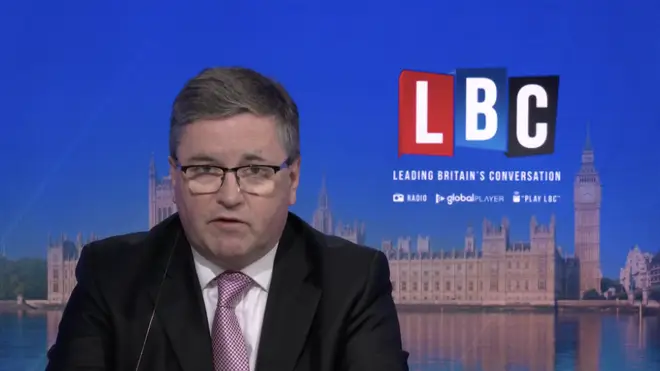
Simon Marks 3pm - 6pm
16 September 2020, 05:47 | Updated: 16 September 2020, 08:46

Serious criminals 'to serve two-thirds of jail terms instead of half'
The Justice Secretary today said "it isn't right" that people who commit serious crimes are released after serving only half their sentences.
Robert Buckland told Nick Ferrari on LBC this morning that someone might be found guilty of GBH with intent and be sentenced to six years, but only serve three years in jail. “I don’t think that’s right,” he said.
His remarks came as sweeping new plans to change rules around the release of prisoners are being considered.
Inmates serving four to seven years in jail would no longer be eligible for release half way through their sentences under the plans.
Those prisoners would instead be made to serve two thirds of their sentence under the White Paper being set out later today.
Prisoners who are convicted of terrorism offences or who pose a wide danger to the public will no longer be automatically released under the new plans.
Community punishments including 20-hour-a-day curfews and the use of satellite monitoring for convicted burglars are among measures set out in the shake-up of sentencing powers.
Read more: Government announces review into coronavirus testing
This morning, LBC's Nick Ferrari asked Mr Buckland “why doesn’t six years mean six years?”
Mr Buckland replied: “There needs to be a system of licence… we want to make sure that when people are coming out of prison they are adjusting to life outside.

“I want to see fewer victims of crime."
Mr Buckland also said he wants to help offenders re-enter the world of work after they are released. "I want people to be able to move on from mistakes of the past.
"In very many cases, the trust [of employers] is being repaid."
The Sentencing White Paper also contains measures aimed at helping rehabilitate offenders, with more flexible community orders allowing them to carry on working in the week and reducing the time before a conviction is classed as "spent".
Justice Secretary Robert Buckland, who will set out further details on Wednesday, said the measures would result in a system that was "fairer, smarter and ultimately better protects the public".
Prime Minister Boris Johnson has already said the reforms will make it easier for "judges to put dangerous offenders behind bars for longer".
But the package, covering in England and Wales, will also include measures at the lower end of the sentencing spectrum.
Community sentences given to offenders instead of prison will be made tougher by doubling the length of time offenders can be subject to curfew restrictions to two years.
The orders can be made more flexible to help offenders keep their jobs, for example by having fewer restrictions from Monday to Friday but then stricter curfews of up to 20 hours at weekends.
In an effort to tackle reoffending, for the first time GPS electronic location monitoring will be routinely used to track burglars, robbers and thieves when they are released from prison.
The technology will allow probation to monitor an offender's whereabouts and, if appropriate, share this data with the police.
For criminals who stay out of trouble, the requirement to routinely disclose offences to employers for non-sensitive roles will be reduced.
Custodial sentences of up to a year will become spent after a further 12 months without reoffending, instead of four years, while terms of one-to-four years will no longer be disclosed after four crime-free years - down from seven.
Sentences of more than four years will not automatically be disclosed to employers once a seven-year period of rehabilitation has been served, instead of for the rest of an offender's life.
Other measures in the White Paper include:
- Whole life orders for child killers, including the ability for judges to hand out this maximum punishment to 18-20 year-olds in exceptional cases.
- New powers to halt the automatic release of offenders who pose a terrorism risk or are a danger to the public.
- Ending the release of offenders sentenced to four-seven years at the halfway point, instead requiring them to serve two-thirds of their term
- Longer minimum sentences for 15-17 year-old murderers.
- Prisoners sentenced to life will serve longer before being eligible for parole.
Mr Buckland said: "For too long our justice system has been beset by complex and confusing laws which the public often feel fail in their most essential aims - to keep them safe and properly punish offenders.
"That ends today. This White Paper is the first step in a fundamental shift in our approach to sentencing, towards one that is fairer, smarter and ultimately better protects the public.
"Our measures will ensure the most serious violent and sexual offenders get the prison time they deserve, while new community interventions and changes to rules around criminal records will help boost rehabilitation and cut reoffending - which means creating fewer victims."
The Government has set a target of 20,000 extra police officers but Mr Johnson told the Cabinet on Tuesday that "there's no point in catching the criminals if they are simply going to be let out early".
He said: "We have seen far too many cases recently of criminals being let out early and then offending again and the judges being unable to impose the stiff sentences that they want and that society wants because of the restrictive guidelines that they face."